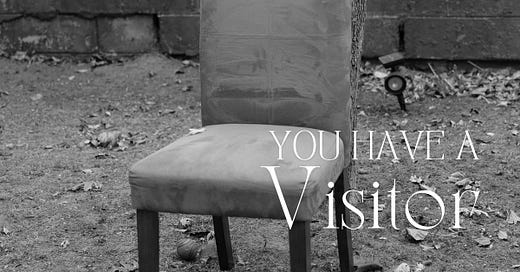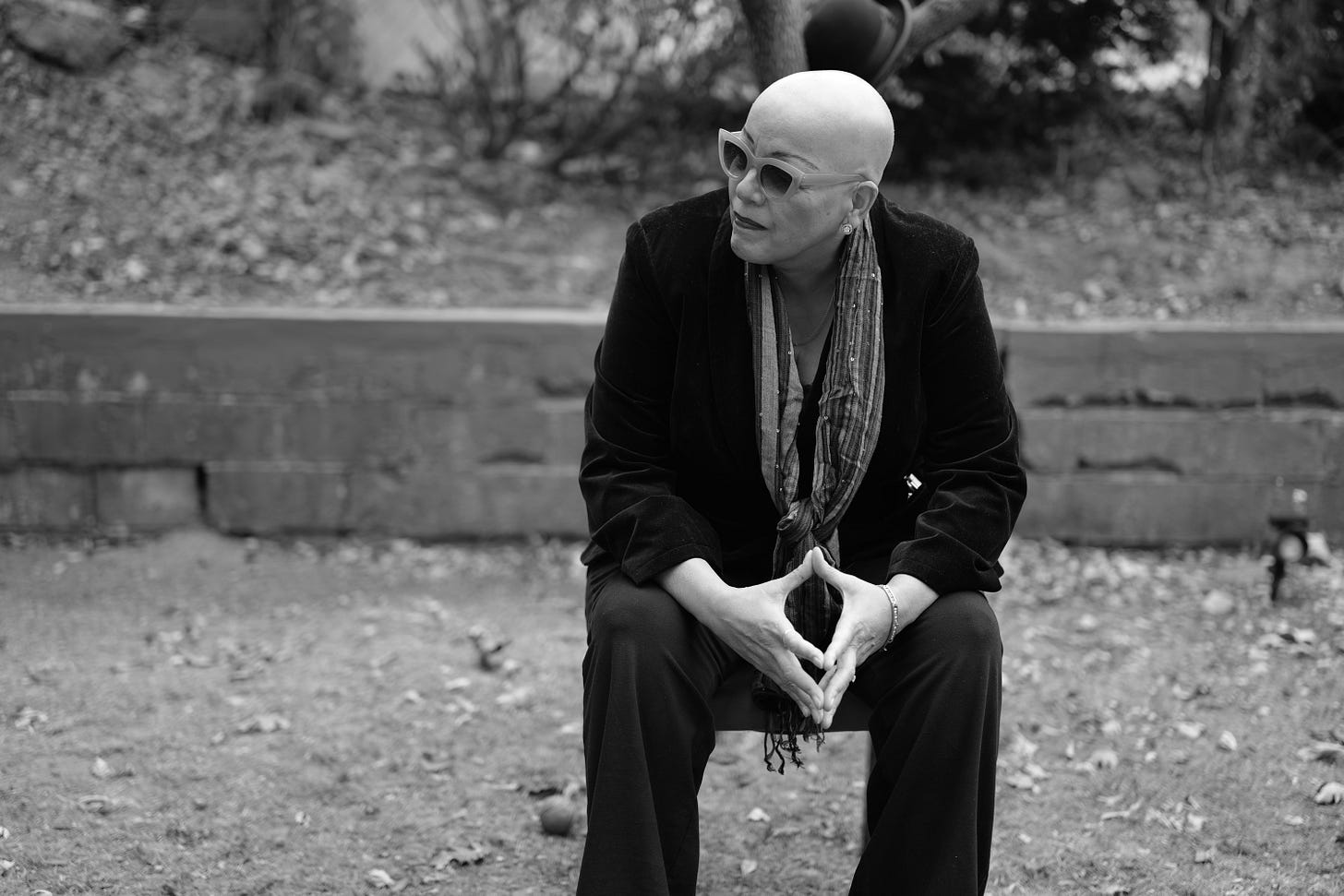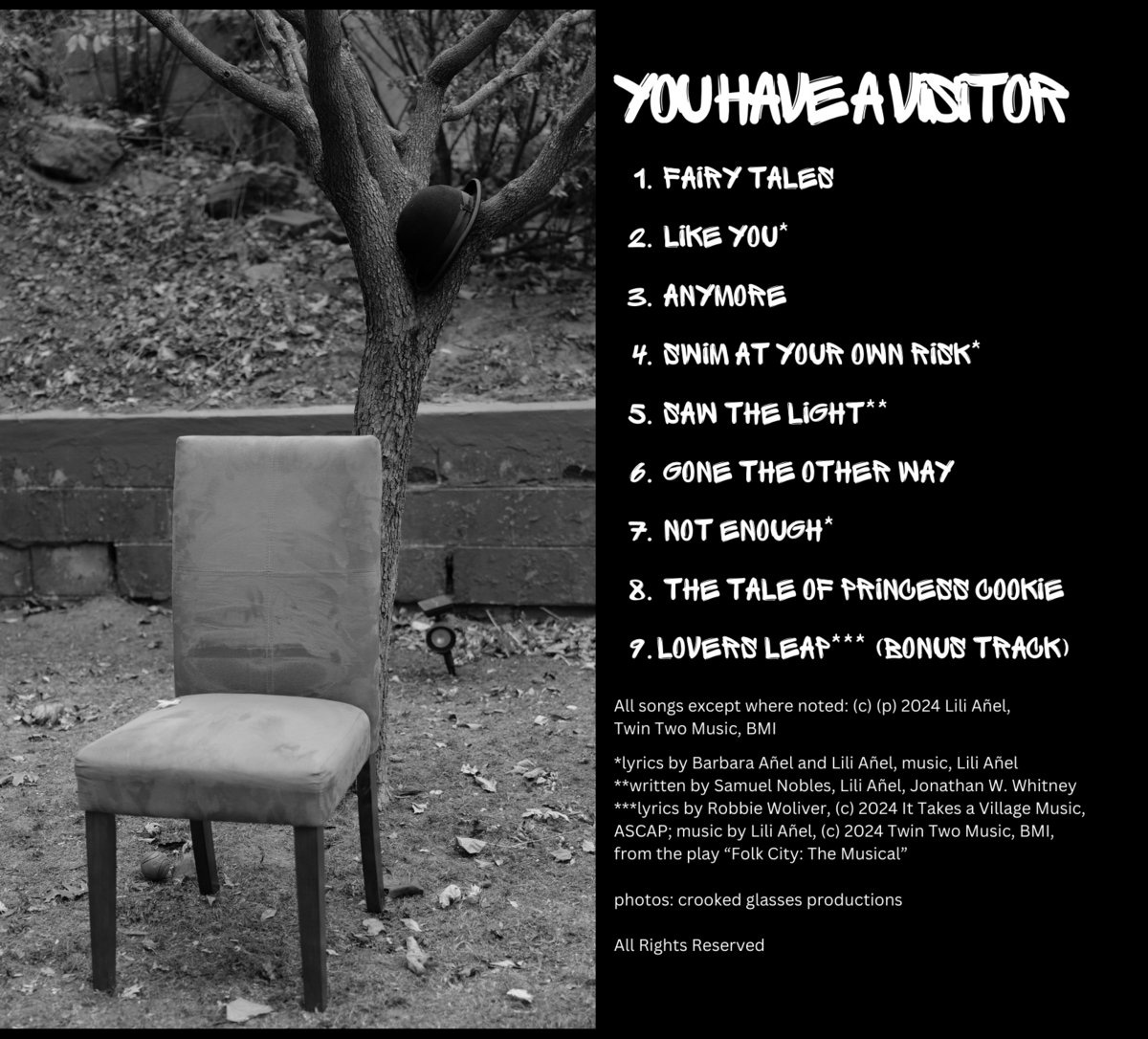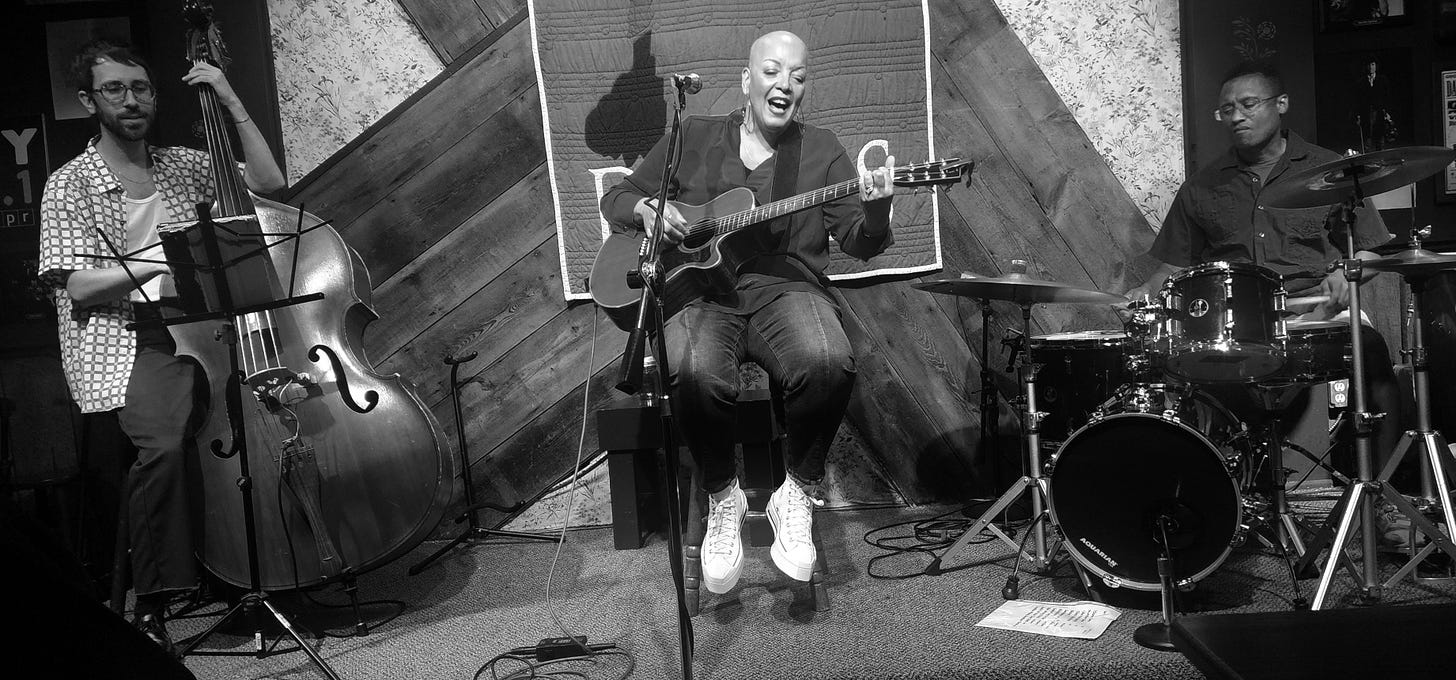Campfire Storytelling with a Very Talented, Musical Friend
Lili Anel's ‘You Have A Visitor’: sweetest words ever on an LP worth listening to
“These songs unlocked a different side of me. A lot more ‘storytelling’ in my writing. I wrote a fairy tale (‘The Tale of Princess Cookie’) and an improvised piece. It was magic how it happened. During the recording session, Sam was warming up and began to play a bass line and kept repeating it. I suddenly heard a melody and words and I began singing. Jonathan jumped in on percussion. It naturally came together. The song fades in as our engineer was making some changes, then he heard what we were doing and lucky for me, he hit the record button. A melody with spoken word. ‘Saw the Light’ came off the top of my head, and Sam's bass and Jonathan's congas. Part fact, part fiction, and totally improvised. Pushing boundaries outside my comfort zone. This record is simple and straight from our souls, and I hope you enjoy these new songs as much as we did giving them life.” — liner notes
“The undertow is bad…” — “Swim At Your Own Risk”
Lili Añel has become a kind of friend, watching over me, rooting me on, and at times, feeling so deeply with me that my pain seems to intertwine with hers. But here’s the thing, we can move on from the bad undertow, and goddamn, isn’t that what art is for?
The Feb. 3, 2025 release of You Have A Visitor, Añel’s ninth album, is the sum total result of the heartache and pain of breakage and revival, intimate, tumultuous, pure, and thoroughly original, thoroughly modern music she not only hears with every breath, but feels, down to her core. Not only that, but she’s one of a very few indie artists able to convey such feeling beyond the superficial level for listeners like me.
The award-winning, NYC-born, Philly-based guitarist/vocalist/composer does what real artists are supposed to do: bleed over the script, in excruciating detail, casually dropping truth bombs, and telling campfire stories with friends — like we did before radio, video, and the Internet made fools of us all.
After Coachella’s slick, four-on-the-floor, A.I.-generated sound effects masquerading as aura, one can’t help but crave the human touch — however raw, vulnerable, and imperfect. The scratch of strings as alloy meets flesh…a hip-trippy dip into Jonathan W. Whitney’s percussive range…the loop-de-loop of Samuel Nobles’ acoustic, roundhouse literary bent on its last haunches…the pause of reflection as Añel’s voice rises and falls, and sometimes falters, reaching for curvature and completion (road trip rhythmic “Fairy Tales”)…ah, the stories.
The eight-piece journal, plus bonus track (“Lovers Leap” from the award-winning “Folk City: The Greenwich Village Musical”), profoundly marks Añel’s move from NYC to Philly 20 years ago, her first time trying on the producer hat (lyricist sister Barbara with the assist), and pulling it off with an acoustic-feel of a trio.
You Have A Visitor also holds a lot of meaning, referencing the unprecedented times of a life-altering pandemic and lockdown, as well as the presence of greatness in the Elm Street Studios (July 8 and 9, 2024), voices that seemed to sit in on the Añel trio sessions, infusing her deeply personal music with inspiring company.
“Some of these songs were written during the pandemic. None of us had visitors or visited. My songs visited me, and I dove in every day, bringing them to life,” Añel described of the process in the liner notes. “I felt like we had ‘visitors’ during our recording sessions, that brought the unexpected. Discussions of musicians who came before us that we all admired, Nina Simone, Jef Lee Johnson, John Lennon, Jaco Pastorius, and others, I felt contributed a feeling that helped the sessions rise up, fill the air. It was ‘church.’ That's where the title You Have A Visitor came from.”
Her decision to keep the album spare, as if it were just the listener and her trio chiming in on the day’s, the past years’ events, lent authenticity throughout the naturally immersive experience…you’re just dropping by, so stay awhile for some coffee and pie and catching up.
All of that was intentional, and Añel’s real-to-real, person-to-person forte.
“I was initially going to record a ‘solo’ record, voice and guitar,” Añel continued in the liner notes. “But I liked how my songs sounded as I had been performing them live, with acoustic bass and drums/percussion. Still minimal, but adding color, texture. These songs sound in their truest form, how I wrote them. I produced this record based on this. There are no overdubs or guest musicians. Yes, there could have been more on these songs, but I liked how they shone on their own.”
“Just one last kiss goodbye, the end of the show. The word is out, the money’s gone, they’re talkin’ on the street. Everyone keeps asking me, I can’t take the heat.”
The song that best describes Añel in her element isn’t even brought up in any of her media assets, and it’s my favorite gem. A mix of easy confession, soft, sudden rebuke, and where two or more are gathered — church — can be found in the fourth track, “Swim At Your Own Risk.”
The internal holy war slopes and bends, unravels and vindicates, and rights wrongs, as if written and writing itself ages ago, just waiting for her to awaken, reach out, and share with others going through the same shit.
The lyrics and the music come pre-fused together, emboldening and enriching so much emotion in one story, set to gentle waves, vaguely shimmering melancholy — percussive encroachment, a blanket of lovely falling string rain — gaping wounds righteously rendered in a silky roulette, banked up against the punchline of hard reality (“leave you with that look on your face, leave you with that look on your face, leave you with that stupid look”).
…leave you with that stupid look…
That line, repeated until she calls out the perpetrator, is as close to vindication for the rest of us unable to fight back.
You can clearly hear the rug pulled out from under her, in a musical, long-form letter of ambient, red-letter sonic churning.
Añel has a knack for putting the soft and hard of life together, letting the strumming beats serve as her joy and the vocals her clapbacks…sounding an awful lot like comedian Chris Rock on a roll.
“Love is not for the safe or weak.” — “Lovers Leap”
The bonus track, “Lovers Leap,” shows off her ability to contour all those emotions into a specific form, for someone else’s story, but with the same gracious, weathered understanding — the bright side, if you will.
Wrapped up in tangy, sheared, nostalgic guitar that reverberates and lingers, and strolling rhythms, befitting smitten couples walking into their unknown futures, “Lovers Leap” features strong vocals in a romantic, country-western setting. The music is so all-encompassing, folding in on itself — musical hand-holding — a gracious coming together of Robbie Woliver’s words and Añel’s music, as if composed by one person.
“I wanted to include the song ‘Lovers Leap’ that I co-wrote with my friend Robbie…. As a songwriter, it showcases my ability to lend my writing to suit a lyric, a genre/style. I was happy with how well this song turned out. I loved the lyric when I first read it and was glad to have been able to do it justice musically. It’s not always the easiest thing, co-writing songs. On this record, I believe I’ve been successful [liner notes].”
“Lovers Leap” is set to appear in the film adaptation by director Jane Spencer, a Venice Film Festival awardee.
It’s a very good, stand-alone song that humanizes in musical form what love feels like, and maybe why so many young kids nowadays refuse to even bother. Think of “Lovers Leap” as the Carpenters’ “We’ve Only Just Begun,” but for Boomers in the post-pandemic.
More of this, please.
“You just believe in yourself, you’re an Añel-ian.” — “Saw the Light”
Can you hear the jumpy, heartbeat bass line? It’s everything in “Saw the Light,” an improvised, riff-gesture of Spoken Word/vocal storytelling.
Nobles was just revving up for the next track, as jazz musicians do, beat-boxing on the fly, when Whitney jumped in on (what sounds like) congas, just for fun. Then, Añel joined in, digging off the play on “find the light” and that colorful bassline, laying down a leisurely, musical bit of anecdotal conversation that sprung from one thought and one look — at a bum wanting wine in the city — to her sister’s suggestion to zen out to Buddhist wisdom, and so on.
Personality, meaning, and story bundled up in the hip heartbeat and her snap-to-soar, Gil Scott Heron-inspired Spoken Word/vocal get-together, “I was so glad Brendan hit ‘record.’ It was magic and creation all rolled into one [liner notes].”
“Riding Hood bamboozled a conniving canine.” — “Fairy Tales”
Nobody can bring “Fairy Tales” back down to earth — in a straight-ahead/folk sashay and a little retro-jingle, with simple, zig-zag guitar slash-and-drive rhythms — like Añel. She puts her own gritty NYC-to-Philly spin on what it means to believe in magical characters without losing the magic.
She juxtaposes aliens, love at first sight, Pinocchio, and flying cows with winning the billion-dollar lottery, a crisscross of childhood folklore and her reality, while keeping true to her love in a time of war mentality.
A highlight is the bass solo that skims over her see-saw vocal melody, a nice intro to the rest of the show.
“She had a pet dog named Tony…” — “The Tale of Princess Cookie”
Añel personalizes the “Fairy Tales” theme in walking cool, daddy-o, hepcat bass amidst her Afro-Cuban origins in “The Tale of Princess Cookie,” a nice Spoken Word/vocal expansion.
She lets the bass walk and the in-betweens breathe, while she deftly speaks/sings an everyday fairy tale of her own, from what she knows of her culture, imbuing her own tough-talking, quick-witted, larger-than-lively Spanish Harlem/South Bronx upbringing — including vocally acting out the characters — to tomboy Princess Cookie’s singing dog Tony and cha-cha dancing, Spanish pet horse Arturo, nursing a bit of a cold.
It all feels so spontaneous, imaginative, and amazing.
A charming showcase of Añel’s gift for gab, jazz, and knowing when to come in and when to leave.
The finale, as she winds up the Spoken Word storytelling interspersion, sparkles with a sweet upswinging, “They lived happily ever after, the end.”
“I won’t join a club, existing to snub…” — “Like You”
“Like You” swings up and down on lower registers, as if carrying a heavy weight but yearning to lift off, far away from it all. There’s guitar, a speckle of percussion on cue, and a bit of jazz-forward, surprisingly pop-melodic bass, but it’s mostly what Añel does with her voice that lands.
She sweet-tarts through her point of view about — whaddya know — the very thing I’ve been writing about…this influencer culture, the haves and have-nots winding their way around hijacked, corporate Coachella-like festivals lost in the desert, conjuring up another similar folk artist from the not-too-distant past — Joni Mitchell, and her little-known, cult-masterpiece from her critically acclaimed, 1974 album, Court and Spark.
Somehow, Mitchell foresaw the vanity fair of the future in “People’s Parties,” where appearances meant more than what’s shaking and fumbling on the inside, and nothing real matters anymore when it’s easier to fake it:
“I told you when I met you I was crazy, cry for us all, Beauty
Cry for Eddie in the corner, thinking he’s nobody
And Jack behind his joker, and stone-cold Grace behind her fan
And me in my frightened silence, thinking I don’t understand
I feel like I’m sleeping, can you wake me?
You seem to have a broader sensibility
I’m just living on nerves and feelings, with a weak and a lazy mind
And coming to people’s parties, fumbling, deaf, dumb, and blind
I wish I had more sense of humour, keeping the sadness at bay
Throwing the lightness on these things, laughing it all away
Laughing it all away
Laughing it all away
Laughing it all away…”
The same haves vs. have-nots déjà-vu (“the rest of us, so very few”) floats, settles, and resonates in Lili Añel’s Phoebe-Snow-like reverie with every note she plays. Not because of awards, status, and accolades, but in spite of them…by her simply putting in the hard work, opening herself up again and again, yet still suffering the humiliating, blindsiding consequences — the collective, emotional cost of real artists everywhere, watching the influencer culture steal the show and wondering what the actual fuck?
I might as well put “Like You” on repeat whenever I go online and laugh at Natalie Merchant’s “Carnival” of “cheap thrill seekers, vendors, and dealers” crowding around social media.
It’s all the same in the end, is it not?
“Fair is fair, life is not…” — “Anymore”
One of the most poignant ballads of give-and-take, closing doors, broken trust…broken dreams, how it feels to be left behind, abandoned, utterly destroyed by someone you respected, believed in, and loved, only to stand there empty-handed.
The guitar, bass, and vocals each sing their mournful reprise, one more brick in the wall.
She sings as if slogging through pain in real time, fingers moving over strings on their own, over and over the same, damned hill, so the vocals are cracked and dying and on their last breath.
Simply breathtaking.
“‘Cause I keep learning, that what I’m yearning for the love in your eyes, is just not enough for me.” — “Not Enough”
High off blossoming bass grooves, pulling at the hem of her daydreaming regret, the resonant light-jazz-pop instrumentals of our parents’ ‘70s-‘80s, and folksy-yearning vocal resonance, “Not Enough” serves as Añel’s tender, but clear-eyed look back at the near-misses of the modern wanderer — neither pie-in-the-sky, nor dismissively cynical.
It’s as close to a love song as she’s likely to get.
She turns the other cheek over and over, musically and vocally, armed with steely, starry-eyed, bittersweet regret (“kissed over a hundred frogs, I waited for Prince Charming, he never arrived”), leaving the page blank for the next one.
“I survived heartbreak and pain, somehow I don’t know how, I don’t know how…” — “Gone the Other Way”
A lot of “Gone the Other Way” lives on the waving cattails of an Afro-Cuban percussive riff that spits and crawls in faraway spaces in Añel’s full-blown song of what-ifs.
Whitney and Añel, drums and guitar and vocals, steal the show with equally powerful, magnetic performances, each the undercurrent of the other…holding onto notes like life rafts in the “steady rain.”
The pick-apart roulade of the percussionist’s cantilever beats blankets Añel’s cultural roots, freeing her to vocally ripple and roam her past-imperfect, turning pages of weather-worn contemplations — like picking scabs — with an almost secondary back-and-forth mambo of memories and wishful thinking, “if only I’d gone the other way.”
All you’re left with in its aftermath is a cascading sense of an approaching dawn and new, child-like hope, picking you up and carrying you away…loosely knit together with infectiously upbeat, intoxicatingly complex, pleasant, comforting music…
…the off-Broadway equivalent of that friend in Lili Añel coming over to give you, the listener, a warm hug that fills you up inside — after all you’ve both been through.
Does that make sense?
Next review: Yelena Eckemoff and “Scenes From the Dark Ages”
PERSONNEL:
Lili Añel (vocals, guitar)
Samuel Nobles (acoustic bass)
Jonathan W. Whitney (drums, congas, djembe, kenkeni, sangba, dundunba, mixing assist)
Barbara Añel (production assist, lyricist)
Brendon McGeehan (engineer, aural guitar creation)
UPCOMING GIGS:
The Clifford Brown Jazz Festival in Delaware, June 18-21, 2025
Bryn Mawr Twilight Concerts, Folk Fest Preview Show, PA, Aug. 1, 2025
The Philadelphia Folk Festival, Aug. 15-17, 2025







